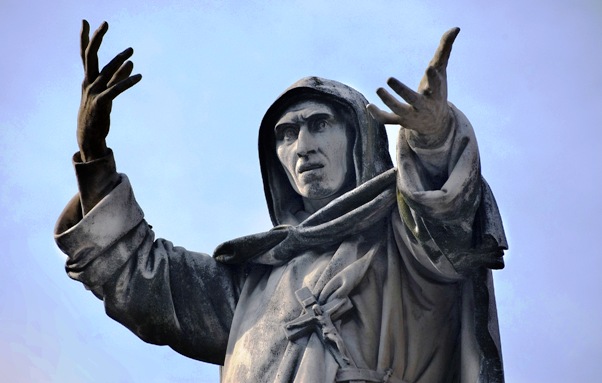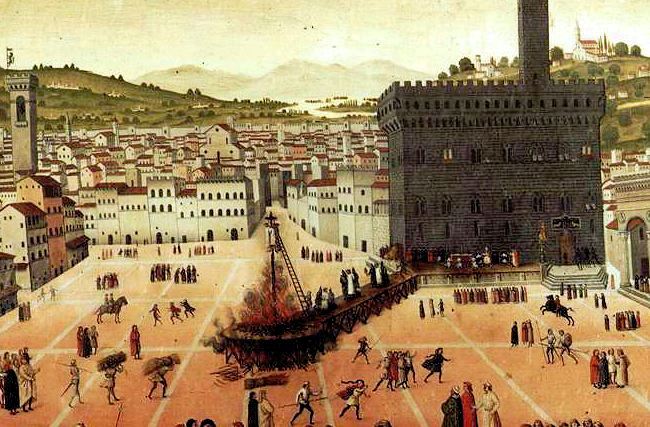![]()
The Words of the Davies Family
|
|
The Words of the Davies Family |

In these days, when evil is treated as a philosophical abstraction, it is refreshing to read of the life of Girolamo Savonarola, a man who lived in times very similar to our own, yet was unafraid to speak out what he knew to be true. Girolamo Savonarola was a Dominican friar, when, in 1489, he was summoned to Florence, the center of the Italian Renaissance, by its ruler Lorenzo de Medici. The Medici family had come to power on the strength of its position as bankers to the great families of Italy, and by ruthless and unscrupulous means had gained control of the Florentine Government. Their corruption was reflected in the lives of the Florentines themselves.
The Renaissance was an awakening of man's realization of the beauty of the physical world and the pleasures it had to offer. Although this did much to liberate men from the rather constricted view of life as propounded in Medieval Christianity, and so produced great art, scientific and geographical discovery, it was, however, liable by its very nature to lead people away from the Church, to disregard morality, and to enter into licentious living.
The disgraceful example of the Church, with its great wealth and corruption, did little to check this tendency, and the streets of Florence were filled with prostitutes, drunkards, and ruffians; gambling houses stayed open all night, obscenities were scrawled on the walls of houses, and the lewder the popular songs, the more popular they were.
Savonarola decided that here was his mission. Other preachers tried to charm their audiences but Savonarola spoke out bluntly and passionately against the evils that he saw. His power was such that many flocked to hear him, feeling in his presence an authority which could not be ignored. In 1492 he began to receive revelation, and as his prophecies about the deaths of Lorenzo and Pope Innocent IX and about the chastisement of Florence were fulfilled, his authority became even greater.
There was more than emotion in his speeches. Although his aim was to reform the morals of his people, he also propounded sensible reforms of the politics and economics of his time, in order to give more freedom and opportunity to all men. He organized bands of boys to keep the streets clean and to show example of his preaching. He recruited girls who went to the brothels and with reason and quiet persuasion converted the whores to a better way of life. So great was his influence that, as biographer noted, "Licentious young men seem as if by magic transformed into students of religion." In 1497 he began to preach directly against the corruption of the Church, and in particular the behavior of the Pope. This was the start of his downfall for it led to his excommunication. However, after deliberating for a year as to his responsibility to God, he was persuaded by the City Council (Who were concerned at the revival of the old ways in his absence) to come out of his self-imposed silence.
On Christmas Day, 1497, he celebrated Mass three times at the Cathedral of San Marco. His preaching against the Pope and his adulterous ways prompted the Pope to demand his imprisonment: this the Florentines refused, and the Pope imposed a trade interdict on the city. But coming on top of a bad winter, rocketing corn prices, a virulent plague, and the power which Savonarola's enemies had gained during his silence, the people turned against him. Just as he had been the city's savior, now he was to be the city's scapegoat, and in 1498 he was arrested by the City Council is being a threat to law and order.

Terrible torture was inflicted upon him to obtain a pathetic confession which he later recanted, and his final humiliation was his being presented naked in the main square, garroted, and burnt at the stake.
At the time, his may have seemed a fruitless mission, but only thirty years later Martin Luther, saying almost the same thing as Savonarola, precipitated the Protestant Reformation which changed the entire religious picture of Europe by freeing men from the bondage of a hypocritical and totalitarian system of spiritual salvation, that they might examine again the teachings of Jesus, to thirst after a deeper understanding of God, and to prepare themselves for the Second Advent.
We are today living in a time similar to that of Savonarola, when the world is lost with no moral guide lines or targets; when progress in science, knowledge, and technical ability only reveals more starkly the barren nature of man's spiritual life. Yet deep in men's hearts there is a yearning for true values, harmony and love between individuals, and peace in the world. The Church has not provided a dynamic moral and religious lead in the search for God and is losing its grip on the hearts of men. The evils of the world are plain to see, and God is looking for men of courage and great heart to stand up and speak out what they know to be true. If the story of Girolamo Savonarola can inspire us today, to stand up and speak out for God, his life and death will not have been in vain.